英语的范文汉字姓名中文名字翻译英文名字格式
名字格式英文作文

名字格式英文作文英文:My name is Sarah, and I'm often asked about the format of my name. In English, we generally write our names with the first letter of each name capitalized, and the rest in lowercase. So, my name is written as Sarah.However, there are different formats for different cultures and languages. For example, in Chinese, the surname comes first, followed by the given name. So, if my name were written in Chinese, it would be written as 王莎拉(Wang Sha La), with my surname Wang (王) coming first.In some cultures, people also have middle names or multiple given names. In English, it's common to useinitials to represent middle names, so someone with thefull name Sarah Elizabeth Smith might go by Sarah E. Smith.Ultimately, the format of a name is determined bycultural and linguistic conventions. It's important to be aware of these conventions when communicating with people from different backgrounds and cultures.中文:我的名字是莎拉,在英语中,我们通常将名字的第一个字母大写,其余小写。
人名英语写法
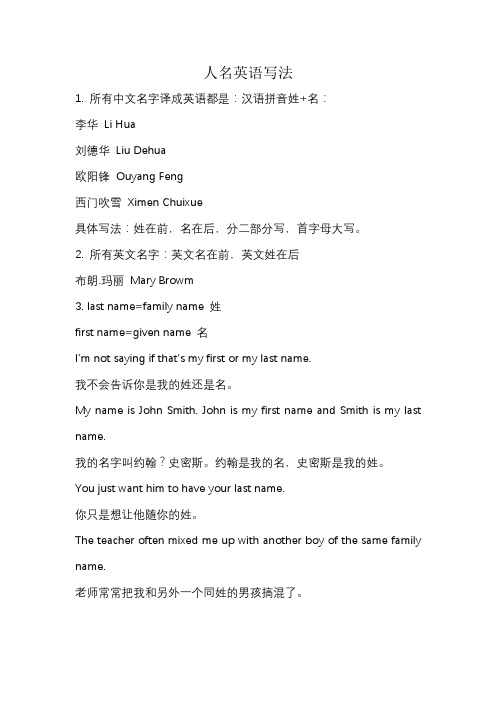
人名英语写法
1. 所有中文名字译成英语都是:汉语拼音姓+名:
李华Li Hua
刘德华Liu Dehua
欧阳锋Ouyang Feng
西门吹雪Ximen Chuixue
具体写法:姓在前,名在后,分二部分写,首字母大写。
2. 所有英文名字:英文名在前,英文姓在后
布朗.玛丽Mary Browm
3. last name=family name 姓
first name=given name 名
I'm not saying if that's my first or my last name.
我不会告诉你是我的姓还是名。
My name is John Smith. John is my first name and Smith is my last name.
我的名字叫约翰?史密斯。
约翰是我的名,史密斯是我的姓。
You just want him to have your last name.
你只是想让他随你的姓。
The teacher often mixed me up with another boy of the same family name.
老师常常把我和另外一个同姓的男孩搞混了。
中国的姓名 英语作文
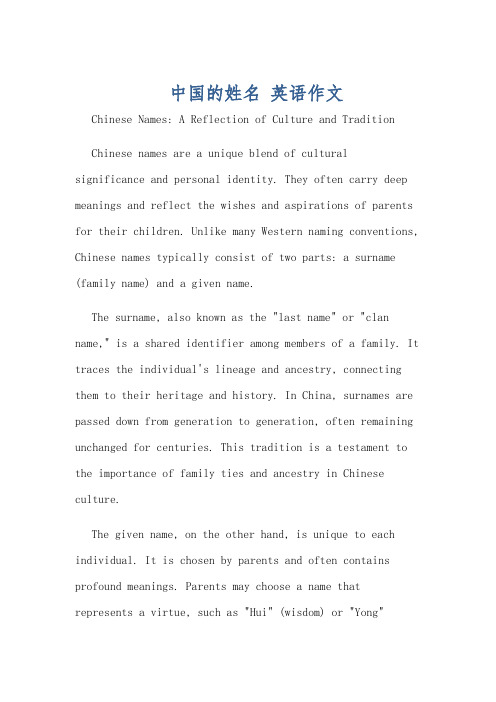
中国的姓名英语作文Chinese Names: A Reflection of Culture and TraditionChinese names are a unique blend of culturalsignificance and personal identity. They often carry deep meanings and reflect the wishes and aspirations of parents for their children. Unlike many Western naming conventions, Chinese names typically consist of two parts: a surname (family name) and a given name.The surname, also known as the "last name" or "clan name," is a shared identifier among members of a family. It traces the individual's lineage and ancestry, connecting them to their heritage and history. In China, surnames are passed down from generation to generation, often remaining unchanged for centuries. This tradition is a testament to the importance of family ties and ancestry in Chinese culture.The given name, on the other hand, is unique to each individual. It is chosen by parents and often contains profound meanings. Parents may choose a name that represents a virtue, such as "Hui" (wisdom) or "Yong"(brave), or a name that sounds pleasing or harmonious. Sometimes, names are chosen to commemorate a special event or person, such as a grandparent or ancestor.The selection of a name is a significant event in Chinese culture. Parents take great care in choosing a name that not only sounds good but also carries positive meanings and aspirations. They may consult with family elders, relatives, or even fortune-tellers to ensure that the name is auspicious and brings good luck to the child.In addition to their cultural significance, Chinese names also play an important role in social interactions. They are used as a means of addressing and referring to individuals in a respectful manner. In Chinese society, using a person's full name is considered polite and respectful, especially when addressing someone older or in a position of authority.Moreover, Chinese names often carry emotional value and are closely tied to a person's identity. Many Chinese individuals feel a strong sense of pride and belonging when they hear their name being called, as it represents their connection to their family, culture, and history.In conclusion, Chinese names are a reflection of therich cultural traditions and values of the Chinese people. They carry deep meanings and aspirations, and play an important role in social interactions and personal identity. Through their names, Chinese individuals are connected to their heritage, history, and family, which are integralparts of their cultural identity.中国姓名:文化与传统的体现中国姓名是文化意义与个人身份的独特融合。
中国名字 英文书写格式

中国名字英文书写格式Chinese Names in English Writing FormatIntroduction:Chinese names have a rich cultural significance and often carry deep meanings. When writing Chinese names in English, it is essential to follow the appropriate format to ensure accuracy and clarity. This article explores the recommended guidelines for writing Chinese names in English and provides examples to illustrate the proper format.1. Use Surname First:In Chinese culture, the surname is typically written before the given name. Therefore, when writing Chinese names in English, it is customary to follow the same order. For example, if the name is "张三" (Zhang San), "Zhang" is the surname, and "San" is the given name.2. Avoid Transliteration Mistakes:Translating Chinese names into English requires careful consideration of pronunciation and meaning. It is crucial to choose appropriate phonetic equivalents while keeping the original meaning intact. For instance, the name "李丽" (Li Li) should not be translated as "Li Lee," as it fails to reflect the correct pronunciation.3. Use Capital Letters for Surname:To distinguish the surname from the given name, it is recommended to write the surname in capital letters. For example, the name "王小明" (WangXiaoming) should be written as "WANG Xiaoming". This convention helps readers easily identify the surname within the name.4. Include Spaces between Names:In English writing, it is customary to include spaces between the surname and given name in Chinese names. For example, the name "陈大伟" (Chen Dawei) should be written with a space as "CHEN Dawei". This format enhances readability and avoids potential confusion.5. Use Proper Capitalization Rules:Chinese names in English should follow the standard rules of capitalization. Capitalize the first letter of the surname and given name, while using lowercase letters for any additional characters. For example, the name "王小明" (Wang Xiaoming) should be written as "Wang Xiaoming" and not "WANG XIAOMING" or "wang xiaoming".6. Preserve Original Order for Multiple Given Names:If a Chinese name consists of multiple given names, it is crucial to maintain the original order when writing in English. For example, the name "李小红" (Li Xiaohong) should be written as "Li Xiaohong" and not "Xiaohong Li". This preserves the integrity of the name and reflects its original structure.7. Abbreviate Only If Commonly Used:In some cases, Chinese individuals may use an abbreviated form of their given name when communicating in English. However, it is essential to ensure the abbreviation is widely recognized and accepted. For example, "张一" (Zhang Yi) may choose to be addressed as "Z.Y." if it is a commonly used abbreviation.8. Be Mindful of Cultural Sensitivity:When writing Chinese names in English, it is crucial to be respectful and mindful of cultural sensitivity. Avoid using nicknames or making assumptions about the meaning of certain characters within the name. Always confirm the correct spelling and formatting with the individual or an authoritative source.Conclusion:Writing Chinese names in English requires adherence to specific guidelines to accurately represent the name's pronunciation and structure. Following the recommended format, including capital letters for the surname, using spaces between names, and preserving the original order of given names, will ensure clarity and readability. It is important to prioritize cultural sensitivity and accuracy when writing Chinese names in English to demonstrate respect for individuals' identities and their cultural heritage.。
2013优秀高中英语作文:中国人的名字ChineseNames
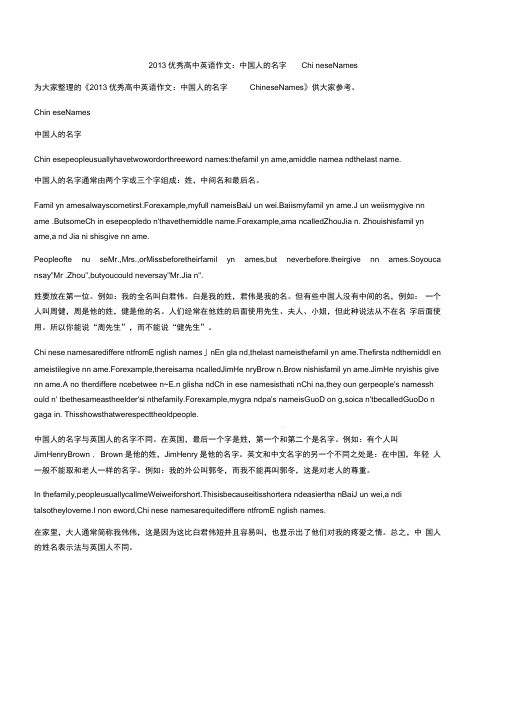
2013优秀高中英语作文:中国人的名字Chi neseNames为大家整理的《2013优秀高中英语作文:中国人的名字ChineseNames》供大家参考。
Chin eseNames中国人的名字Chin esepeopleusuallyhavetwowordorthreeword names:thefamil yn ame,amiddle namea ndthelast name.中国人的名字通常由两个字或三个字组成:姓,中间名和最后名。
Famil yn amesalwayscometirst.Forexample,myfull nameisBaiJ un wei.Baiismyfamil yn ame.J un weiismygive nn ame .ButsomeCh in esepeopledo n'thavethemiddle name.Forexample,ama ncalledZhouJia n. Zhouishisfamil yn ame,a nd Jia ni shisgive nn ame.Peopleofte nu seMr.,Mrs.,orMissbeforetheirfamil yn ames,but neverbefore.theirgive nn ames.Soyouca nsay"Mr .Zhou",butyoucould neversay"Mr.Jia n".姓要放在第一位。
例如:我的全名叫白君伟。
白是我的姓,君伟是我的名。
但有些中国人没有中间的名,例如:一个人叫周健,周是他的姓,健是他的名。
人们经常在他姓的后面使用先生、夫人、小姐,但此种说法从不在名字后面使用。
所以你能说“周先生”,而不能说“健先生”。
Chi nese namesarediffere ntfromE nglish names」nEn gla nd,thelast nameisthefamil yn ame.Thefirsta ndthemiddl en ameistilegive nn ame.Forexample,thereisama ncalledJimHe nryBrow n.Brow nishisfamil yn ame.JimHe nryishis give nn ame.A no therdiffere ncebetwee n~E.n glisha ndCh in ese namesisthati nChi na,they oun gerpeople's namessh ould n' tbethesameastheelder'si nthefamily.Forexample,mygra ndpa's nameisGuoD on g,soica n'tbecalledGuoDo n gaga in. Thisshowsthatwerespecttheoldpeople.•' I中国人的名字与英国人的名字不同。
姓名翻译英语模板作文范文
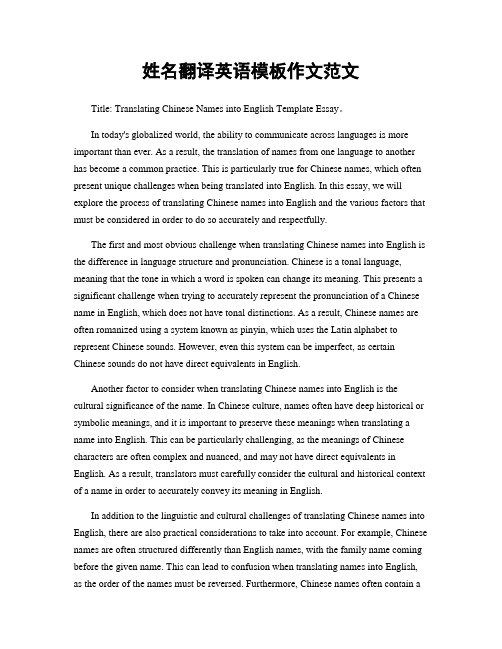
姓名翻译英语模板作文范文Title: Translating Chinese Names into English Template Essay。
In today's globalized world, the ability to communicate across languages is more important than ever. As a result, the translation of names from one language to another has become a common practice. This is particularly true for Chinese names, which often present unique challenges when being translated into English. In this essay, we will explore the process of translating Chinese names into English and the various factors that must be considered in order to do so accurately and respectfully.The first and most obvious challenge when translating Chinese names into English is the difference in language structure and pronunciation. Chinese is a tonal language, meaning that the tone in which a word is spoken can change its meaning. This presents a significant challenge when trying to accurately represent the pronunciation of a Chinese name in English, which does not have tonal distinctions. As a result, Chinese names are often romanized using a system known as pinyin, which uses the Latin alphabet to represent Chinese sounds. However, even this system can be imperfect, as certain Chinese sounds do not have direct equivalents in English.Another factor to consider when translating Chinese names into English is the cultural significance of the name. In Chinese culture, names often have deep historical or symbolic meanings, and it is important to preserve these meanings when translating a name into English. This can be particularly challenging, as the meanings of Chinese characters are often complex and nuanced, and may not have direct equivalents in English. As a result, translators must carefully consider the cultural and historical context of a name in order to accurately convey its meaning in English.In addition to the linguistic and cultural challenges of translating Chinese names into English, there are also practical considerations to take into account. For example, Chinese names are often structured differently than English names, with the family name coming before the given name. This can lead to confusion when translating names into English, as the order of the names must be reversed. Furthermore, Chinese names often contain alarge number of characters, which may need to be shortened or simplified in order to be easily pronounced and remembered in English.Despite these challenges, there are a number of strategies that can be used to effectively translate Chinese names into English. One common approach is to use a phonetic approximation of the name, which attempts to capture the sound of the original name in a way that is easily pronounceable for English speakers. This can be done by using similar-sounding English words or names, or by using a system such as pinyin to represent the original Chinese sounds. However, it is important to note that this approach may not always accurately convey the meaning or cultural significance of the original name.Another strategy for translating Chinese names into English is to use a literal translation of the name's meaning. This approach involves identifying the individual characters in the Chinese name and finding English words that correspond to their meanings. While this method can be effective in preserving the original meaning of the name, it can also be challenging, as the meanings of Chinese characters are often highly context-dependent and may not have direct equivalents in English.In conclusion, the translation of Chinese names into English is a complex and challenging task that requires careful consideration of linguistic, cultural, and practical factors. While there are a number of strategies that can be used to effectively translate Chinese names into English, it is important to approach this task with sensitivity and respect for the cultural significance of the names being translated. By doing so, translators can ensure that Chinese names are accurately and respectfully represented in English, allowing for clear and meaningful communication across languages and cultures.。
中文姓名Chinese name

外国留学生入学申请表
APPLICATION FORM FOR INTERNATIONAL STUDENTS
注:请用中文或英文印刷体填写,填写时请用钢笔或签字笔
Notes: This form is to be completed in block letter with pen by the applicants in Chinese or English.
申请人保证I hereby affirm that:
(1)上述各项中所提供的情况真实无误;
All the information in this form is accurate and truthful;
(2)在中华人民共和国学习期间遵守中华人民共和国法律和学校的规章制度;
I shall abide by the laws of the People’s Republic of Chi na and the regulations of Shandong University at
Weihai
(3) 接受山东大学威海分校对学习的安排。
I shall accept the arrangements of Shandong University at Weihai regarding my studies.
日期:年月日申请人签字:
Date: Year Month Day Applicant’s signature:
Shandong University at Weihai NO.180 Wenhua Xilu, Weihai, P. R. China 264209
Tel:+86-631-5688756 Fax: +86-631-5688787。
名字英文格式作文范文
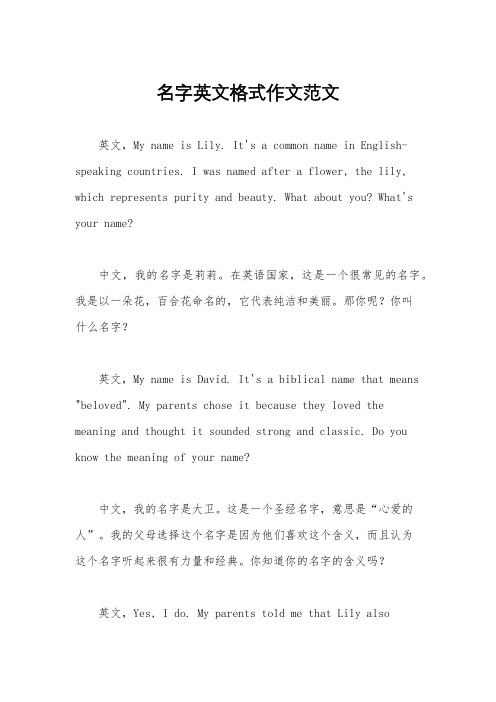
名字英文格式作文范文英文,My name is Lily. It's a common name in English-speaking countries. I was named after a flower, the lily, which represents purity and beauty. What about you? What's your name?中文,我的名字是莉莉。
在英语国家,这是一个很常见的名字。
我是以一朵花,百合花命名的,它代表纯洁和美丽。
那你呢?你叫什么名字?英文,My name is David. It's a biblical name that means "beloved". My parents chose it because they loved the meaning and thought it sounded strong and classic. Do you know the meaning of your name?中文,我的名字是大卫。
这是一个圣经名字,意思是“心爱的人”。
我的父母选择这个名字是因为他们喜欢这个含义,而且认为这个名字听起来很有力量和经典。
你知道你的名字的含义吗?英文,Yes, I do. My parents told me that Lily alsomeans "innocence" and "purity". It's a very fitting namefor me because I try to live my life with those values in mind.中文,是的,我知道。
我的父母告诉我,莉莉也表示“纯真”和“纯洁”。
这个名字非常适合我,因为我尽量按照这些价值观来生活。
英文,That's great! It's always nice when your name has a special meaning to you. Have you ever met someone withthe same name as you?中文,太好了!当你的名字对你有特殊的含义时,总是很好的。
名字格式英文作文模板
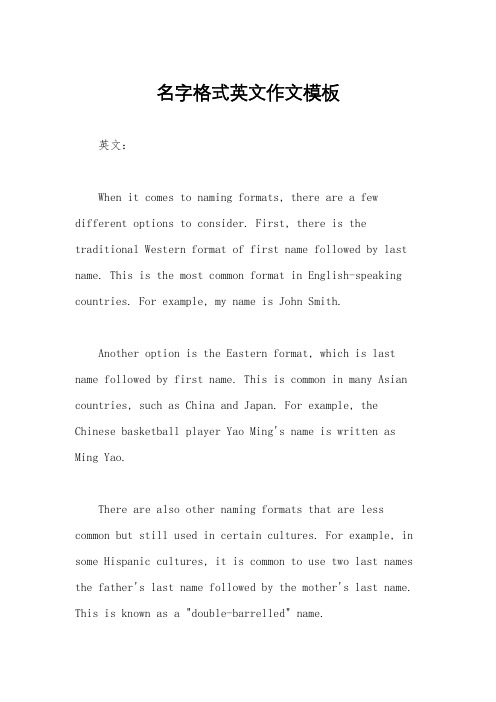
名字格式英文作文模板英文:When it comes to naming formats, there are a few different options to consider. First, there is the traditional Western format of first name followed by last name. This is the most common format in English-speaking countries. For example, my name is John Smith.Another option is the Eastern format, which is last name followed by first name. This is common in many Asian countries, such as China and Japan. For example, the Chinese basketball player Yao Ming's name is written as Ming Yao.There are also other naming formats that are less common but still used in certain cultures. For example, in some Hispanic cultures, it is common to use two last names the father's last name followed by the mother's last name. This is known as a "double-barrelled" name.Ultimately, the naming format you choose will depend on your cultural background and personal preference. It's important to remember that there is no right or wrong wayto format your name as long as it is clear and consistent.中文:说到名字格式,有几种不同的选项需要考虑。
英语作文中中文名字

英语作文中中文名字Title: 中国名字。
Chinese names are rich in meaning and cultural significance. Unlike Western names, which are often chosen for their sound or popularity, Chinese names are carefully selected to reflect the values and aspirations of the family. In this essay, we will explore the beauty and complexity of Chinese names, and how they contribute to the rich tapestry of Chinese culture.First and foremost, Chinese names are deeply rooted in tradition and history. They are often chosen based on the principles of yin and yang, the five elements, and the Chinese zodiac. For example, a family may choose a namethat reflects the harmony and balance they wish to instill in their child, or one that represents the virtues they hope their child will embody. This careful consideration of meaning and symbolism makes Chinese names unique and deeply personal.Furthermore, Chinese names are often a reflection of the family's hopes and dreams for their child. It is not uncommon for parents to choose a name that carries positive connotations, such as "Jing" (静) for tranquility, "Xin" (心) for sincerity, or "Hao" (好) for goodness. These names serve as a constant reminder of the values and virtues that the family wishes to instill in their child, and they carry with them a sense of pride and responsibility.In addition, Chinese names are also a way for families to honor their heritage and ancestors. Many Chinese names are passed down through generations, carrying with them the legacy of those who came before. This practice serves to connect the past, present, and future, and it reinforces the importance of family and tradition in Chinese culture.Moreover, Chinese names often have a poetic and lyrical quality that sets them apart from Western names. They are often composed of two or three characters, each with its own meaning and significance. For example, the name "Yuanjing" (远景) combines the characters for "distant" and"prospect," evoking a sense of hope and possibility. This poetic quality adds depth and beauty to Chinese names, making them a source of pride and identity for those who bear them.In conclusion, Chinese names are much more than just labels; they are a reflection of the values, aspirations, and heritage of the family. They are carefully chosen to carry meaning and symbolism, and they serve as a constant reminder of the virtues that the family wishes to instill in their child. Chinese names are a testament to the richness and complexity of Chinese culture, and they play a vital role in shaping the identity and values of the individuals who bear them.。
中文名字和英文名字差异英语作文
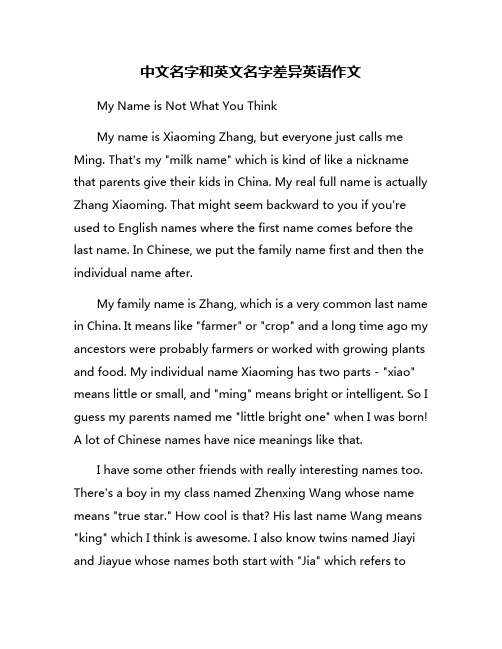
中文名字和英文名字差异英语作文My Name is Not What You ThinkMy name is Xiaoming Zhang, but everyone just calls me Ming. That's my "milk name" which is kind of like a nickname that parents give their kids in China. My real full name is actually Zhang Xiaoming. That might seem backward to you if you're used to English names where the first name comes before the last name. In Chinese, we put the family name first and then the individual name after.My family name is Zhang, which is a very common last name in China. It means like "farmer" or "crop" and a long time ago my ancestors were probably farmers or worked with growing plants and food. My individual name Xiaoming has two parts - "xiao" means little or small, and "ming" means bright or intelligent. So I guess my parents named me "little bright one" when I was born!A lot of Chinese names have nice meanings like that.I have some other friends with really interesting names too. There's a boy in my class named Zhenxing Wang whose name means "true star." How cool is that? His last name Wang means "king" which I think is awesome. I also know twins named Jiayi and Jiayue whose names both start with "Jia" which refers tothem being from the same family. Jiayi means "outstanding talent" and Jiayue is "outstanding grace." Aren't those just beautiful names?Then we have English names on top of our Chinese names too. I'm called Michael at my English classes and my friend Zhenxing goes by Samuel. For the twins Jiayi and Jiayue, they chose the English names Jessica and Jennifer. It's pretty common for Chinese kids to pick an English name, especially if we learn English or go to an international school. My teacher tells me I should introduce myself as "Michael Zhang" when speaking English. Feels kind of weird using two names, but I'm getting used to it.The rules for English names are really different from Chinese names though. Like I said, Chinese names put the last name first. English names put the first name before the last name, so my name would be listed as "Michael Zhang" instead of "Zhang Michael." English first names also seem more simple and random compared to Chinese names. A lot of them are just regular words like Michael, Jennifer, Samuel, or Jessica without any special meanings.Some English names do come from words with meanings, but they can be pretty obscure and hard to figure out. My friendSamuel's name means "told by God" which is a strange name meaning in my opinion. And a lot of English names come from different languages like Hebrew, Latin, Greek, and others - not just English itself.Then you have the middle names which is something we don't really have in Chinese. I think Michael is an okay first name for me, but if I could pick a middle name I'd want something cooler and more meaningful like "Dragon" or "Thunderbolt." That would be an awesome name: Michael Thunderbolt Zhang!Another big difference is how many names and words make up the full name in Chinese vs English. My full name in Chinese is just three words: Zhang Xiaoming. Some kids have an extra "milk name" like me, so they have four words total for their name. But we never have more than four words in our Chinese name.English names can have a lot more words! You've got the first name, middle name(s), last name for starters. But then some people also have suffixes like "Jr." or "III" after their name if they were named after their dad or grandpa. And wives often take their husband's last name when they get married and use "Mrs." So an English name can be like 5 or 6 words in total sometimes! That's a huge name!I think Chinese names are prettier and more meaningful overall compared to English names. They usually describe hopes for the child or make references to nature. English names feel more random to me without as much direct meaning behind them. Although some English names from other languages like Hebrew can have cool spiritual meanings too.At the end of the day though, a name is just a name and doesn't really define who you are as a person. I'm proud of my Chinese name Zhang Xiaoming and my English name Michael. They both represent parts of my culture and identity. I'm a Chinese kid growing up in a globalized world. Whether you call me Zhang Xiaoming, Ming, or Michael, I'm still the same person - A bright, energetic, mischievous (and hopefully someday accomplished) young man with a love for learning about the world around me!。
中文名字英文名字作文
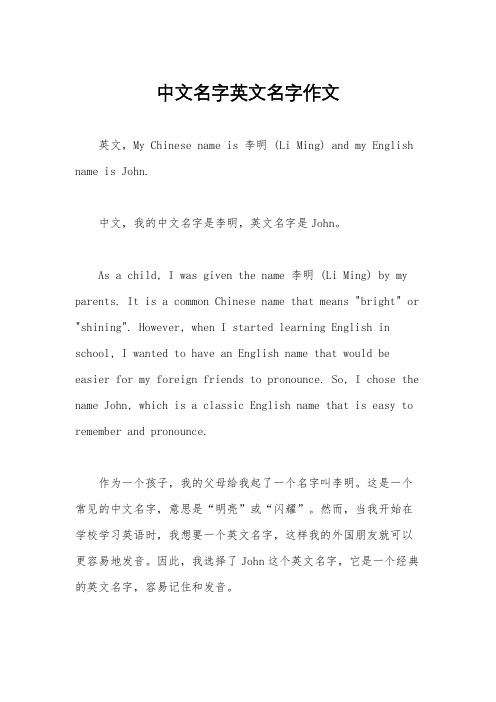
中文名字英文名字作文英文,My Chinese name is 李明 (Li Ming) and my English name is John.中文,我的中文名字是李明,英文名字是John。
As a child, I was given the name 李明 (Li Ming) by my parents. It is a common Chinese name that means "bright" or "shining". However, when I started learning English in school, I wanted to have an English name that would be easier for my foreign friends to pronounce. So, I chose the name John, which is a classic English name that is easy to remember and pronounce.作为一个孩子,我的父母给我起了一个名字叫李明。
这是一个常见的中文名字,意思是“明亮”或“闪耀”。
然而,当我开始在学校学习英语时,我想要一个英文名字,这样我的外国朋友就可以更容易地发音。
因此,我选择了John这个英文名字,它是一个经典的英文名字,容易记住和发音。
Having an English name has its advantages. It allows me to communicate more easily with my foreign friends and colleagues, and it also helps me to integrate better into English-speaking cultures. For example, when I introduce myself to an English-speaking person, I can simply say "Hi, my name is John" instead of trying to explain the pronunciation and meaning of my Chinese name.拥有一个英文名字有其优点。
中国名字正确的英文名字书写方法
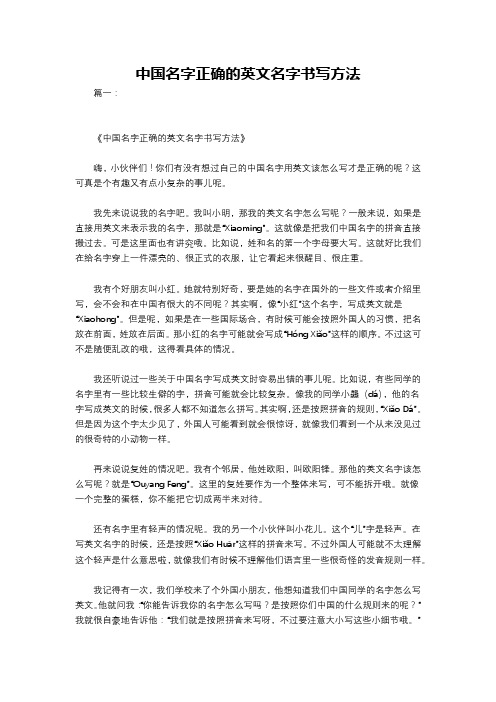
中国名字正确的英文名字书写方法篇一:《中国名字正确的英文名字书写方法》嗨,小伙伴们!你们有没有想过自己的中国名字用英文该怎么写才是正确的呢?这可真是个有趣又有点小复杂的事儿呢。
我先来说说我的名字吧。
我叫小明,那我的英文名字怎么写呢?一般来说,如果是直接用英文来表示我的名字,那就是“Xiaoming”。
这就像是把我们中国名字的拼音直接搬过去。
可是这里面也有讲究哦。
比如说,姓和名的第一个字母要大写。
这就好比我们在给名字穿上一件漂亮的、很正式的衣服,让它看起来很醒目、很庄重。
我有个好朋友叫小红。
她就特别好奇,要是她的名字在国外的一些文件或者介绍里写,会不会和在中国有很大的不同呢?其实啊,像“小红”这个名字,写成英文就是“Xiaohong”。
但是呢,如果是在一些国际场合,有时候可能会按照外国人的习惯,把名放在前面,姓放在后面。
那小红的名字可能就会写成“Hóng Xiǎo”这样的顺序。
不过这可不是随便乱改的哦,这得看具体的情况。
我还听说过一些关于中国名字写成英文时容易出错的事儿呢。
比如说,有些同学的名字里有一些比较生僻的字,拼音可能就会比较复杂。
像我的同学小龘(dá),他的名字写成英文的时候,很多人都不知道怎么拼写。
其实啊,还是按照拼音的规则,“Xiǎo Dá”。
但是因为这个字太少见了,外国人可能看到就会很惊讶,就像我们看到一个从来没见过的很奇特的小动物一样。
再来说说复姓的情况吧。
我有个邻居,他姓欧阳,叫欧阳锋。
那他的英文名字该怎么写呢?就是“Ouyang Feng”。
这里的复姓要作为一个整体来写,可不能拆开哦。
就像一个完整的蛋糕,你不能把它切成两半来对待。
还有名字里有轻声的情况呢。
我的另一个小伙伴叫小花儿。
这个“儿”字是轻声。
在写英文名字的时候,还是按照“Xiǎo Huār”这样的拼音来写。
不过外国人可能就不太理解这个轻声是什么意思啦,就像我们有时候不理解他们语言里一些很奇怪的发音规则一样。
ChineseNames(中国人的名字)

ChineseNames(中国人的名字)Chinese Names(中国人的名字)Chinese NamesChinese people usually have two word or three word names: the family name, a middle name and the last name.Family names always come tirst. For example, my full name is Bai Junwei. Bai is my family name. Junwei is my given name. But some Chinese people don't have the middle name. For example, a man called Zhou Jian. Zhou is his family name,and Jian is his given name.People often use Mr. , Mrs. , or Miss before their family names, but never before.their given names. So you can say "Mr. Zhou", but you could never say "Mr.Jian".Chinese names are different from English names. In England, the last name is the family name. The first and the middle name is tile given name. For example,there is a man called Jim Henry Brown. Brown is his family name. Jim Henry is his given name. Another difference between~ E.nglish and Chinese names is that in China, the younger people's names shouldn't be the same as the elder's in the family.For example, my grandpa's name is Guo Dong, so i can't be called Guo Dong again.This shows that we respect the old people.In the family, people usually call me Weiwei for short. This is because it is shorter and easier than Bai Junwei, and it also they love me. In one word, Chinese names are quite different from English names.中国人的名字中国人的名字通常由两个字或三个字组成:姓,中间名和最后名。
英文名格式 三个字的中文名初中英文范文

英文名格式三个字的中文名初中英文范文English: Choosing an English name for a three-character Chinese name can be a challenging and important decision for many people.Chinese: 为三个字的中文名选择一个合适的英文名对很多人来说是一个具有挑战性和重要性的决定。
English: Firstly, it's important to consider the cultural and phonetic differences between Chinese and English when choosing an English name for a Chinese name.Chinese: 首先,在为中文名选择英文名时,考虑中英文之间的文化和语音差异是非常重要的。
English: The sound and pronunciation of the English name should ideally be easy for English speakers to pronounce, while also maintaining some connection to the original Chinese name.Chinese: 英文名的发音应该尽量容易被英语听者发音,同时也要保持一定程度与原始中文名的联系。
English: Additionally, the meaning of the English name should also be considered, as it can represent the personality or traits of the individual.Chinese: 此外,英文名的含义也应该被考虑,因为它可以代表个人的个性或特征。
高三年级英语作文:中国人的名字

高三年级英语作文:中国人的名字Chinese people usually have two word or three word names: the family name, a middle name and the last name.中国人的名字通常由两个字或三个字组成:姓,中间名和最后名。
Family names always come tirst.For example, my full name is Bai Junwei.Bai is my family name. Junwei is my given name.But some Chinese people don't have the middle name. For example, a man called Zhou Jian. Zhou is his family name,and Jian is his given name.姓要放在第一位。
例如:我的全名叫白君伟。
白是我的姓,君伟是我的名。
但有些中国人没有中间的名,例如:一个人叫周健,周是他的姓,健是他的名。
People often use Mr. , Mrs. , or Miss before their family names, but never before.their given names.So you can say "Mr. Zhou", but you could never say "Mr.Jian".人们经常在他姓的后面使用先生、夫人、小姐,但此种说法从不在名字后面使用。
所以你能说“周先生”,而不能说“健先生”。
Chinese names are different from English names.In England, the last name is the family name. The first and the middle name is tile given name.For example,there is a man called Jim Henry Brown. Brown is his family name. Jim Henry is his given name.Another difference between~ E.nglish and Chinese names is that in China, the younger people's names shouldn't be the same as the elder's in the family.For example, my grandpa's name is Guo Dong, so i can't be called Guo Dong again.This shows that we respect the old people.中国人的名字与英国人的名字不同。
英文中中文名字的写法
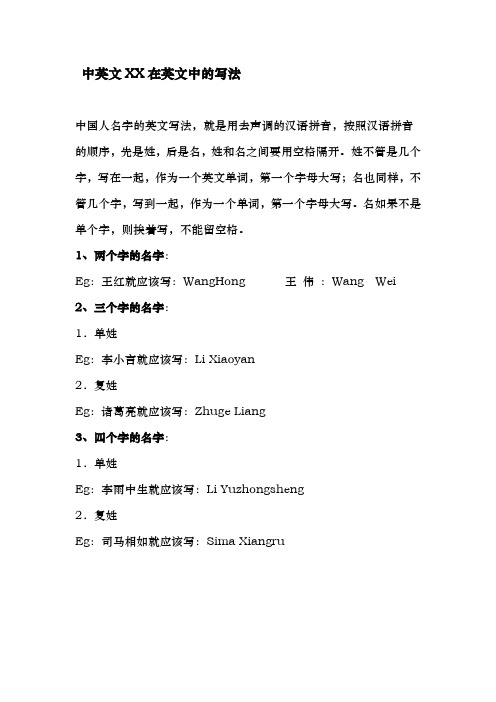
中英文XX在英文中的写法
中国人名字的英文写法,就是用去声调的汉语拼音,按照汉语拼音的顺序,先是姓,后是名,姓和名之间要用空格隔开。
姓不管是几个字,写在一起,作为一个英文单词,第一个字母大写;名也同样,不管几个字,写到一起,作为一个单词,第一个字母大写。
名如果不是单个字,则挨着写,不能留空格。
1、两个字的名字:
Eg:王红就应该写:WangHong 王伟:Wang Wei 2、三个字的名字:
1.单姓
Eg:李小言就应该写:Li Xiaoyan
2.复姓
Eg:诸葛亮就应该写:Zhuge Liang
3、四个字的名字:
1.单姓
Eg:李雨中生就应该写:Li Yuzhongsheng
2.复姓
Eg:司马相如就应该写:Sima Xiangru
英文名字的写法
现在大多数的英语国家人的名字通常由三部分组成,西方人的习惯是名字在前,姓在后,二者之间如果有中间名(Middle name),中间名一般用简写:
1、教名first name/given name/Christian name(教名),由于大多数英语国家人士信仰基督教,所以是基督教徒
2、中间名/自取名middle name,通常是为纪念先辈或父母亲朋中受尊敬人士而用其名来命名的,一般说来中间名的纪念色彩较浓。
但是在很多场合,中间名往往略去不写。
3、姓氏family name/last name,继承父辈的,只是位置是在最后。
全名=教名+自取名+姓(Full name=1+2+3),
Eg:Joanne Kathleen Rowling
George Bush
在英美的风俗习惯中,女人出嫁前跟从父姓,出嫁后改用丈夫姓,去掉父姓。
- 1、下载文档前请自行甄别文档内容的完整性,平台不提供额外的编辑、内容补充、找答案等附加服务。
- 2、"仅部分预览"的文档,不可在线预览部分如存在完整性等问题,可反馈申请退款(可完整预览的文档不适用该条件!)。
- 3、如文档侵犯您的权益,请联系客服反馈,我们会尽快为您处理(人工客服工作时间:9:00-18:30)。
英语的范文汉字姓名中文名字翻译英文名字格式
1.如果你是英文名字,中文的姓,可以按照西方的方式写。
例如:Rick Zhang
2.如果你是中文的拼音,按照中国的顺序,姓在前,名在后;
如果名字是三个字的,后两个字拼音要连在一起。
例如:张文洁Zhang Wenjie
“ ___”这个名字有两种写法:
这种一般写给中国人或会中文的人看,因为中国人习惯姓在前,名在后,你这样写的话,读出来时他也才容易明白
2.Xiaoming Li
这个比较正式,国际上的正式场合用这种比较好,而且这个多是写给外国人看的,因为英语国家的外国人习惯姓在前,名在后
补充:银行的写法又不一样,如果是银行的写法或护照的写法,毛一东是这样的:MAO YI DONG
英文名的英文意思是Englishname,目前各国比较流行英文名,因为世界各国交流多了,有了英文名更方便交流。
英语姓名的一般结构为:教名自取名姓。
如 William·Jefferson·Clinton。
但在很多场合中间名往往略去不写,如 George·Bush,而且许多人更喜欢用昵称取代正式教名,如 Bill·Clinton。
上述教名和中间名又称个人名。
英文名与中文名不同,中文名是姓在前名在后,英文名恰恰相反。
例如:中----李,小明;英----Jake·Wood。
Charming ^_^
举个例子:比如“ ___”这个名字,有两种写法:
1)Li Xiaoming ( 这种一般写给中国人或会中文的人看,因为中国人习惯姓在前,名在后,你这样写的话,读出来时他也才容易明白)
2)Xiaoming Li (这个比较正式,国际上的正式场合用这种比较好,而且这个多是写给外国人看的,因为英语国家的外国人习惯姓在前,名在后)
英文名的英文意思是Englishname,目前各国比较流行英文名,因为世界各国交流多了,有了英文名更方便交流。
英语姓名的一般结构为:教名自取名姓。
如 William·Jefferson·Clinton。
但在很多场合中间名往往略去不写,如 George·Bush,而且许多人更喜欢用昵称取代正式教名,如 Bill·Clinton。
上述教名和中间名又称个人名。
英文名与中文名不同,中文名是姓在前名在后,英文名恰恰相反。
___出台过《中国人名汉语拼音字母拼写规则》
国际体育比赛等场合,人名可以缩写。
汉语人名的缩写,姓全写,首字母大写或每个字母大写,名取每个汉字拼音的首字母,大写,后面加小圆点,声调符号可以省略。
例如:
任家萱缩写为:Ren J.X. 或REN J.X.
三个字的名字用英语写格式:
2.复姓,比如:诸葛亮就应该写:Zhuge Liang。
英文名与中文名不同,中文名是姓在前名在后,英文名恰恰相反。
例如:中----李,小明;英----Jake·Wood。
英文名的英文意思是Englishname,目前各国比较流行英文名,因为世界各国交流多了,有了英文名更方便交流。
英语姓名的一般结构为:教名自取名姓。
如William·Jefferson·Clinton。
但在很多场合中间名往往略去不写,如 George·Bush,而且许多人更喜欢用昵称取代正式教名,如Bill·Clinton。
上述教名和中间名又称个人名。
first name
英 [f?:st neim] 美 [f?st nem]
n.西方人名的第一个字
ItoldhimmyfirstnameandwhereIwasfrom.
我告诉过他我的名和我从哪里来。
family name
英 [?f?mili neim] 美 [?f?m?li nem]
n.姓
Ihaveprintedmyfamilyname,firstname,dateofbirth,andaddress.
我用印刷体写上了我的姓,名,华诞和地址。
中国汉字人名的翻译,可采取的方法推荐如下:
还是以光头强的名字来举例。
首先应该按照汉语拼音来拼写汉字,然后按照英语姓名的顺序排列,而且应该区分汉字的音节,那么就光头强的英语姓名应该写成:tou-qiang guang。
在填表或比较正规场合使用的时候,为了更加清晰,可以写成guang,tou-
qiang。
如果要简写,可以写成T.-Q. guang,这样就没有任何歧义了。
1、中 ___名字在英语中用汉语拼音拼写,姓与名要分开写,不能连在一起,姓与名的第一个字母都要大写,姓氏在前面,名字在后面。
例如:我是张三。
译文:I'm Zhang San .
2、在姓氏和名字都是一个字时,在英语中姓和名的拼音首字母分别大写。
例如:李雷。
英文:Li Lei
3、在姓氏是一个字、名字是两个字时,姓氏写法不变,名字为两个字,这名字的两个字的拼音要连起来写,只大写第一个字的拼音首字母。
例如:韩梅梅。
英文:Han Meimei .
4、在中国姓氏中有复姓,也就是两个字,这样要把姓氏两个字的拼音连起来一起写第一个字母大写。
例如:诸葛亮。
英文:Zhuge Liang .
5、在名字里含有造成发音混淆的拼写字时,一般要用“ ' ”来区分隔开。
例如:张西安。
Zhang Xi'an .
6、中文姓名与英文姓名在写法上是有区别的:中 ___名字是姓在前,名在后;英文姓名是名在前,姓在后。
1. 用汉语拼音,即可;
2. 但是,中文的姓和名变成拼音时要颠倒;如张玉龙,变为:Yulong Zhang ;
3. 中文名字为俩字时,拼成一个词;即:" Yulong ";而不要两个词,
Yu Long ;也不要Yu-Long ;因为中文名字多半有意义,所以应是一个词,不是两个字。
如果名的俩字分开,老外不知怎样称呼你。
Yulong = Jade dragon =玉制的龙。
4. 英文的first name = 中文的名字;last name = 中文的姓。
5. 单名,同理。
模板,内容仅供参考。
